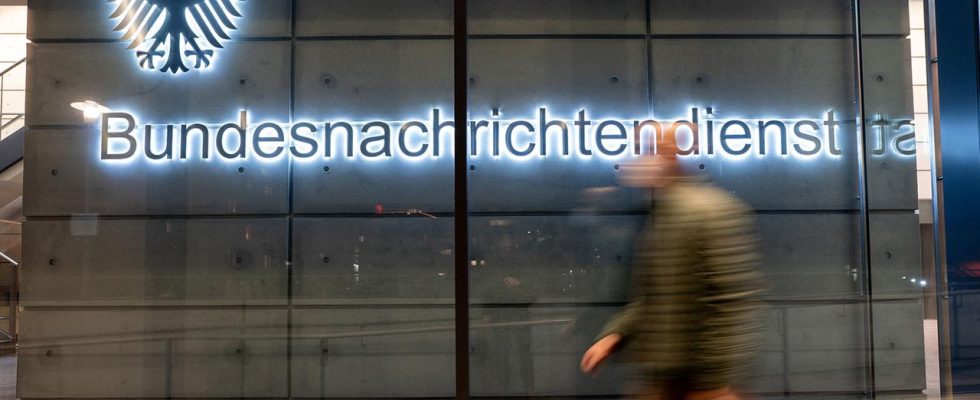exclusive
According to information from WDR, NDR and SZ, the federal prosecutor indicts the BND employee Carsten L. and an alleged accomplice of treason. You face a life sentence.
It is a Hollywood-ready spy thriller that will probably soon occupy the Berlin Court of Appeal: A rich Russian is said to have helped a shady businessman and a senior employee of the Federal Intelligence Service (BND) to sell German state secrets to the Russian secret service. The alleged treason was exposed. The Russian has not yet been caught, but the BND man and his acquaintance are in custody. They will soon have to answer in court.
According to information from WDR, NDR and “Süddeutsche Zeitung”, the federal prosecutor indicted the BND department head Carsten L. and his alleged helper Arthur E. in the case of the so-called BND mole in mid-August before the Berlin Superior Court. The accusation against the two is: treason in a particularly serious case. They face life imprisonment if convicted.
The court has yet to accept the indictment
The Federal Public Prosecutor, the Berlin Court of Appeal and the lawyers for the two accused did not want to comment on the charges when asked. The court must now decide whether the indictment will be admitted. Disciplinary proceedings against employees for possible violations of service regulations are still ongoing at the BND. They are said to have told the authorities that they had been manipulated by Carsten L. in order to give him information.
The investigators at the Federal Criminal Police Office (BKA) are convinced that they can largely reconstruct the alleged betrayal of state secrets. This is also due to the fact that one of the two accused, Arthur E., testified extensively. The BND man Carsten L., however, has been silent since his arrest in December 2022.
Carsten L. switched from the Bundeswehr to the BND in 2007, most recently holding the rank of colonel. He is said to have been dissatisfied with the work in the service. At least he is said to have indicated that to colleagues. An actually routine security check dragged on for several years – people from his environment are said to have described him as “very national”.
promotion before arrest
At the BND, L. worked for several years as head of department in the department for technical reconnaissance (TA) in Pullach, Bavaria, that part of the foreign secret service that deals with the surveillance of worldwide telephone, Internet and satellite communications. A few weeks before his arrest, he was promoted: L. took over the BND’s own security – responsible, among other things, for the security check of employees.
Arthur E., born in Volgograd, Russia, used to be a contract soldier in the Bundeswehr, but left early in 2015. Since then he is said to have run all sorts of businesses such as trading in diamonds and precious stones. He traveled a lot, in flight databases that WDR, NDR and SZ were able to evaluate, numerous flights are noted: to Dubai, Israel, West Africa, Brazil, Southeast Asia, the USA and, again and again, to Russia.
In May 2021, L. and E. are said to have met by chance at a celebration in the Bavarian home of the BND man – in Weilheim. L. is said to have spoken frankly about his work and thus apparently aroused Arthur E.’s interest. According to statements by E., he later came into contact with a wealthy Russian during a stay in Moscow. A possible new business partner? This entrepreneur Visa M. in turn asked for help in obtaining a residence permit for Germany.
Arthur E. apparently believed that the new acquaintance from the BND could help. Carsten L., in turn, apparently caused globetrotter E. to be registered with the BND as a so-called “intelligence service connection”, i.e. as a informant.
At a first joint meeting of Carsten L., Arthur E. and Visa M. in September 2022 at Lake Starnberg, a fateful appointment is said to have come about: Carsten L. is said to have given Arthur E. secret documents from the BND shortly afterwards. These documents are said to have contained information about the war in Ukraine and the Russian mercenary group Wagner.
Arthur E. apparently traveled to Moscow
E. apparently traveled to Moscow with the papers and handed them over to two employees of the Russian domestic secret service FSB. Visa M. is said to have mediated the contact. E. did not have to fear controls at the German border: BND man L. had apparently instructed a colleague from the service to smuggle E. past the German passport and customs control at Munich Airport.
The Russian secret service agents are said to have requested further material shortly after the first delivery. They allegedly asked for certain information about German and American weapons systems that had been delivered to Ukraine. The investigators are said to have later discovered a corresponding request list on Carsten L.’s cell phone. Apparently, obtaining this information was then more difficult.
In the end, people in Moscow were apparently no longer so satisfied with the material that had been delivered. Remarkably, L. is said to have received around 400,000 euros for the betrayal. Investigators found the money in envelopes in a locker.
Notes in fall 2022
In autumn 2022, the BND finally received information from a foreign partner service that secrets had been allegedly betrayed in-house. The search for the mole began. First, a former employee of Carsten L. came into focus. She had looked for the secret documents for him, although there was no official reason for it. The investigators now assume that Carsten L.’s wife was only used.
In December 2022, Carsten L. was arrested in Berlin – a few weeks later his alleged accomplice Arthur E. after he returned from a trip to the USA. The US Federal Police FBI had already questioned E., and he is said to have stated that he had worked for the BND. After his arrest, he is said to have willingly testified to the German investigators. His information is said to have been checked by mobile phone evaluations and financial investigations.
The federal government and the service itself have drawn the first conclusions from the treason case. A current draft for a reform of the BND law also provides for stricter rules for the BND’s own security. In the future, bag or vehicle checks should be allowed to take place on employees, and mobile phones should also be evaluated if there is reasonable suspicion. Despite the high security guidelines in the BND, such measures have not been legally permitted to date.


